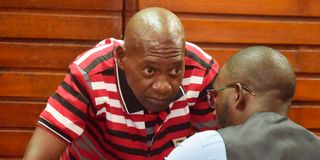Premium
Shakahola: Mackenzie renews bail plea, cites changed circumstances

Paul Mackenzie speaks to his lawyer at the Mombasa Law Court on September 9, 2024.
Suspected cult leader Paul Mackenzie and 91 of his co-accused in the Shakahola deaths cases have, once again, renewed their application to be freed on bond, arguing that circumstances have changed since they were first charged.
Through their lawyer, Lawrence Obonyo, the suspects say that when they were denied bail in April last year, no witness had testified. However, the court has now heard the testimonies of multiple witnesses.
Mr Obonyo told Mombasa Chief Magistrate Alex Ithuku that the number of accused persons has since reduced from 95 to 92. The other three suspects died in custody.
The lawyer urged the court to review its earlier decision, emphasising that probation reports, which were not available at the time of the last ruling, should now be considered.
“The court had not seen the probation reports at the time it made the ruling denying them bail in April last year. These reports were prepared in May, so they should be viewed as new documents that the court ought to consider,” Mr Obonyo said.
He further argued that the suspects are still presumed innocent until proven guilty and that the evidence presented remains under review.
Mr Obonyo also pointed out that the application was not a blanket request, as some accused persons may be favoured by the probation report while others may not.
However, the prosecution, led by Victor Owiti and Jami Yamina, opposed the application, saying there has been no significant change in circumstances to warrant a review of the bail terms.
“The charges have not been amended or substituted. If the charges were serious at the time the suspects were denied bail, then they ought to be more serious now that the court has heard part of the evidence,” Mr Owiti argued.
He urged the court to dismiss the application, terming it unmerited.
Mr Yamina stated that the application was too generalised, making it difficult for the court to assess individual circumstances.
“Bonds and bail are matters touching on individuals, yet this application has been made in a generalised manner, making it difficult for the court to consider the issue of bail,” he said.
The prosecutor also raised concerns about the accused persons’ safety and their likelihood of absconding trial if released before the cases are concluded.
“We have to consider the suspects’ safety. A significant number of bodies are yet to be collected from the mortuary, and the victims are still healing. We are not certain whether the suspects will return to attend trial if they are released on bail,” he said.
Mr Yamina further argued that nothing had been presented to prove that the suspects now had a fixed place of abode. He also raised concerns over their ability to access proper medical care, given that they do not conform to modern medication.
He suggested that if the defence truly believed circumstances had changed, they should have the probation officer review the suspects’ conditions.
“If bail is reviewed, we fear we may not see a single one of them here in court again,” Mr Yamina added.
The prosecution also told the court that the suspects are yet to undergo a deradicalisation programme, hence, it would be unsafe to set them free.
Mackenzie and his co-accused are facing 238 charges of manslaughter following the deaths of over 460 followers of the Good News International (GNI) church in the Shakahola Forest.
The court is expected to rule on their bail application next week when the hearing resumes on March 26.
Last week, witnesses revealed how Mackenzie, with the help of two women, founded the GNI church, which eventually led its followers into a deadly doctrine of fasting to death.
The court heard that Josephine Mbodze and another woman, identified only as Elizabeth, were key figures in establishing the church.
Mbodze was married to Evans Sirya, a prime suspect in the Shakahola massacre. Witnesses and police investigations indicate that both Sirya and Mbodze played crucial roles in the church’s operations.
Chakama Location Chief Raymond Charo testified that Sirya was responsible for procuring burial permits for followers who died in the forest.
He admitted to issuing burial permits for victims of the Shakahola Forest tragedy.
“I issued my first burial permit for the victims on January 28, 2022,” Mr Charo told the court.
He recalled receiving a call from Sirya, informing him of the deaths of Zilpha Adoyo and Raymond Kahindi. The causes of death were misrepresented to cover up what was happening in the forest.
For instance, one death was reported to have been caused by a terminal illness, while another was attributed to asthma. But there was no medical proof provided to support these conclusions before the burial permits were issued.





